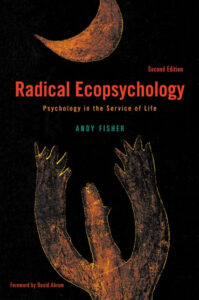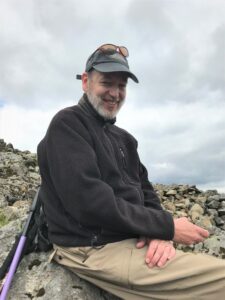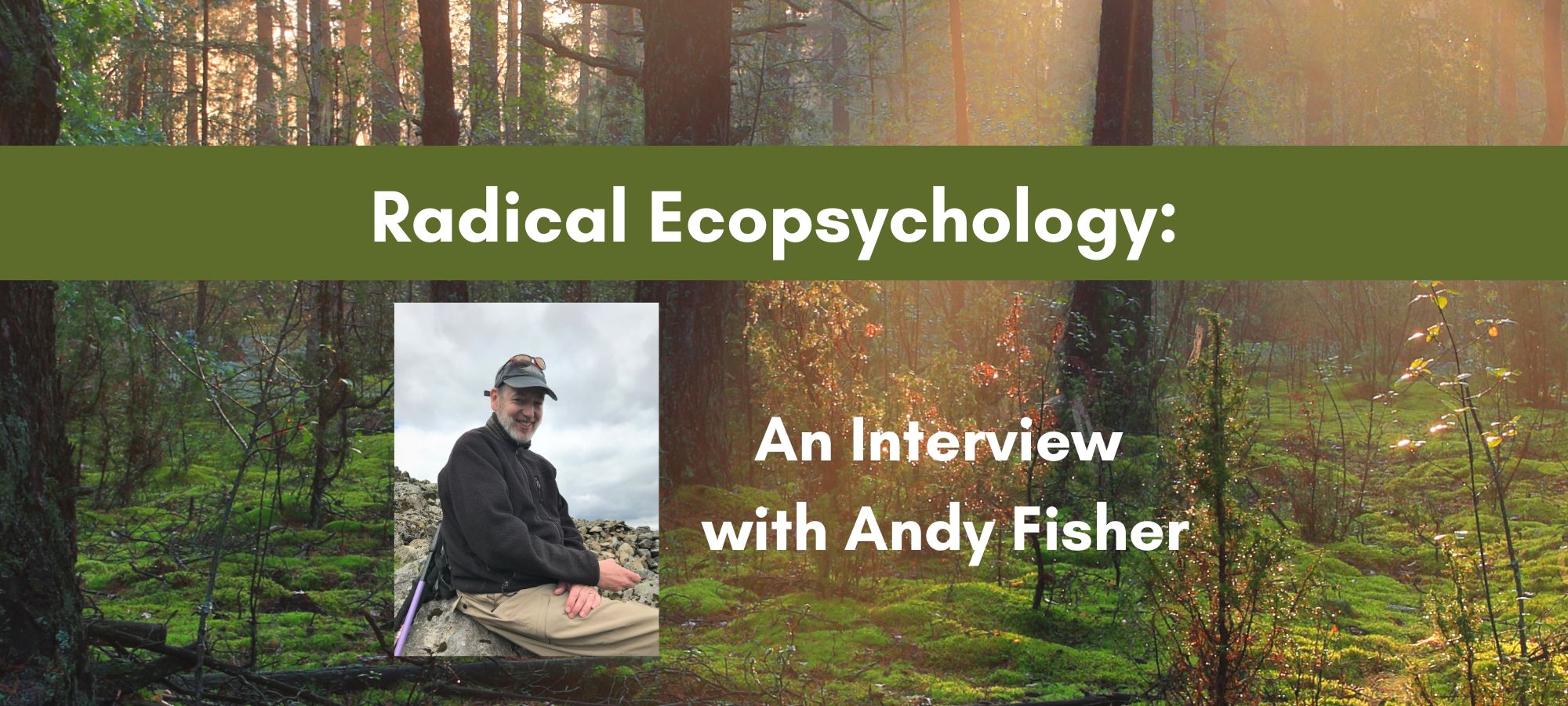Andy Fisher, Ph.D., is a major figure in ecopsychology, having tracked and reflected on the development of the field for the last three decades. He will be co-teaching Pacifica’s “Advanced Training Certificate: Ecopsychology,” January 26, 2024 – April 20, 2024 via Zoom. I’m delighted to speak with him about the certificate and also his work on Radical Ecopsychology.
Angela: When I think of ecopsychology, I think of the connection between human and nature, the shared psyche of both, and ways to heal by becoming more connected with the natural world and tending the well-being of our planet as a way of tending our own psychological well-being. But your book, now in its second edition, Radical Ecopsychology: Psychology in the Service of Life, asks the reader to radicalize ecopsychology. What does that look like, and do you have a different definition of ecopsychology than my generalized understanding of it?
 Andy: I do have a different definition. Yes, it certainly is about reconnecting psyche and nature and overcoming the split or dissociation between them. The field really came together in the mid-1990s and has had various incarnations since then, but has always focused on psyche and nature. So that’s where it starts. Where my approach differs from most is that I say the field is inherently radical in two senses. To overcome the dualism between the psyche and nature is really to remember that the human mind isn’t limited to a human bubble but rather reaches outside the human world to connect with the entire cosmos. This is what I call recollective ecopsychology. It right away places human significance into the larger world, and at the same time says there is psyche in nature, which is the move of re-ensouling the larger natural world. This idea is expressed strongly in the thinking of James Hillman, a big figure in the Pacifica universe, in his reviving the idea of the soul of the world. And also the eco-philosopher David Abram, who uses the term “turning the psyche inside out,” the psyche being a synonym for the soul. The psyche or soul is normally thought to be inside humans, with the world outside us being essentially soulless. But when as ecopsychologists we turn the psyche inside out, we are saying that we are actually in the psyche or soul. So we’re radically challenging the entire modern way of viewing reality.
Andy: I do have a different definition. Yes, it certainly is about reconnecting psyche and nature and overcoming the split or dissociation between them. The field really came together in the mid-1990s and has had various incarnations since then, but has always focused on psyche and nature. So that’s where it starts. Where my approach differs from most is that I say the field is inherently radical in two senses. To overcome the dualism between the psyche and nature is really to remember that the human mind isn’t limited to a human bubble but rather reaches outside the human world to connect with the entire cosmos. This is what I call recollective ecopsychology. It right away places human significance into the larger world, and at the same time says there is psyche in nature, which is the move of re-ensouling the larger natural world. This idea is expressed strongly in the thinking of James Hillman, a big figure in the Pacifica universe, in his reviving the idea of the soul of the world. And also the eco-philosopher David Abram, who uses the term “turning the psyche inside out,” the psyche being a synonym for the soul. The psyche or soul is normally thought to be inside humans, with the world outside us being essentially soulless. But when as ecopsychologists we turn the psyche inside out, we are saying that we are actually in the psyche or soul. So we’re radically challenging the entire modern way of viewing reality.
Ecopsychology is often framed as being about the mental health benefits of connecting with the natural world, but that leaves the larger critical picture untouched. Historically speaking, the soul gets taken out of nature, turning it into brute matter, so that industry can get going with the bulldozers. To put the soul back into the natural world puts the brakes on the bulldozers, and all the other things necessary for the operation of the modern capitalistic world. We also have to remember that the original split between psyche and nature came about through violent historical processes, clearing people from the land to get access to the wealth there and to create landless workers. So I add “society” to the terms psyche and nature, and this gets to my second sense of why ecopsychology is radical. You have to go through society to get from psyche to nature. Otherwise, you’re just taking the individualistic way of understanding the world and the psyche and continuing to repress the social background. We have to look at processes like racism, colonialism, gender, classism, imperialism, and discern how they are connected to the ways humans relate to the natural world. I call this critical ecopsychology, using critical social theory to gain a fuller picture of the relationship between psyche and nature. When you integrate psyche, nature, and society, you deepen into other possible worlds. We need a different world. Everyone knows it. So, this deepening process is how I see ecopsychology participating in the politics of our times.
Angela: I hear so many references within psychological scholarship to both environmental crises and the crisis of mental health. We can add to this cultural or societal crises. I’m guessing that ecopsychology will posit there is a direct connection. But I wonder if you could give your take on the current moment we occupy in history as it relates to both human consciousness and our relationship to the planet. What opportunities and necessities do you see for humanity through that lens?
Andy: The first step is to get an accurate interpretation of the moment by bringing psychological, social, and ecological dimensions together and understanding the nature of the system that generates the splits between them and the crises that result from this. That’s what ecopsychology can offer in a more radical vein: a view of this moment that looks more deeply into the historical and systemic roots, the way the living world is responding to a global social system geared mostly to making money, the way we live the crises in our bodies, the longing for connection and the rage and trauma of this larger crisis. It’s taking our psychological know-how outside of the therapeutic consulting room. We need to turn our consulting rooms inside-out—and not just into the forest, because that leaves the society part out of the picture. The hunger for connection with the natural world is so strong and healing but those practices stay within the realm of private, individualistic therapy models. Which is why the work of Phoenix Smith, who started the Alliance for Ecotherapy & Social Justice, is an example of radical ecopsychology. She doesn’t deny the deep meaning of having a connection with the living land, but she adds that it needs to be in the context of social justice. So she builds practices that brings ecopsychology and social justice together. Everything is so dire and urgent that it can seem like a luxury to think about an intimate relationship with the natural world, but it isn’t. It’s this dialog I’m interested in with radical ecological politics, transforming our practices in light of what this moment means.
Angela: You published an article titled “Ecopsychology as Decolonial Praxis” in Ecopsychology in 2019. I’m curious how ecopsychology intersects with putting decolonial theory into practice.
Andy: It’s politically challenging territory. If ecopsychology aims for the integration of society, nature, and psyche, then we need to think about where the disconnections between them come from in the first place. I’m suggesting capitalism, which is a system of colonization. So as colonial worlds have historically invaded Indigenous worlds these three big divisions between psyche, society, and nature have been introduced, making for all kinds of violence against land and people, all kinds of traumatic disconnection. My starting point, then, is the way reality becomes disintegrated by the modern capitalist colonial system. It’s important to look at the long history of Indigenous strength and struggle to protect Indigenous worlds, and the assumption of the colonial mind that these worlds can just be extinguished. The challenge is that non-Indigenous people deepening into other possible worlds converges with Indigenous worlds, and that’s why the hunger to appropriate Indigenous culture is so strong and such a risk. So it’s important to keep these two processes distinct in our minds. One is decolonialization, which is a term for the resurgence of indigenous worlds, the rematriation of Indigenous lands and life. The other is what I’m now calling un-colonization, which involves undoing colonial structures within the context of non-Indigenous or settler worlds. This is a term that comes from the Taíno activist Tanya Rodriguez. So we can think of ecopsychology as being mostly in a process of uncolonialization, with most people involved in it being non-Indigenous. Certainly where I live, I’m a settler on stolen land, in Algonquin Anishinaabe territory, so if ecopsychology is about our relationship with the land and I’m living on stolen land, then I need to be in solidarity with Indigenous struggle.
Angela: The “Advanced Training Certificate: Ecopsychology” that you’ll be co-teaching is a three-month course offered via Zoom that will combine perspectives from four internationally renowned authors, educators, and transformational leaders in the fields of Ecopsychology and Ecotherapy. Garret Barnwell, Linda Buzzell, Jeanine M. Canty, and yourself will be teaching. What are you most excited about for this course and what effect do you hope it will have on participants?
Andy: We’ve been running this program for four or five years and it’s always a powerful experience for participants, with an overview from four strong figures in the field. It also leans in the more radical direction I’ve been talking about, which differentiates it. People from all over the world are doing it because it’s online. So the richness of the conversations and the excitement from working with the four of us is one of the best ways I think for people to enter into the field of ecopsychology or deepen into it. There’s nothing else like it being offered at the moment.
Angela: In parting, if you could see one change in our world, one moment of healing or understanding that might most move us forward, what would it be?
Andy: That’s a tough one! But I’ll say: reclaiming the idea of society. We live in a time when one of the ruling ideas is that there’s no such thing as society. But without a sense of social bonds and an understanding that the natural world is a social place, we’re just a bunch of separate individuals at war with each other and the living world. So I’d like to see a shift into a more social mode of understanding, where we really “get” that we’re social and political animals. We can then start working together from there.
Angela: Thank you so much for speaking with me and I look forward to reading more of your work.
Join us for Pacifica’s “Advanced Training Certificate: Ecopsychology,” January 26, 2024 – April 20, 2024

Andy Fisher, Ph.D., is author of one of ecopsychology’s primary texts, Radical Ecopsychology: Psychology in the Service of Life (2nd Ed.). He is best known for his critical scholarship and holistic vision of the ecopsychological project. Andy is currently writing a new, 2-volume book, Ecopsychology as Politics: Nature, Psyche, and the Social-Historical Moment. www.andyfisher.ca

Angela Borda is a writer for Pacifica Graduate Institute, as well as the editor of the Santa Barbara Literary Journal. Her work has been published in Food & Home, Peregrine, Hurricanes & Swan Songs, Delirium Corridor, Still Arts Quarterly, Danse Macabre, and is forthcoming in The Tertiary Lodger and Running Wild Anthology of Stories, Vol. 5.


